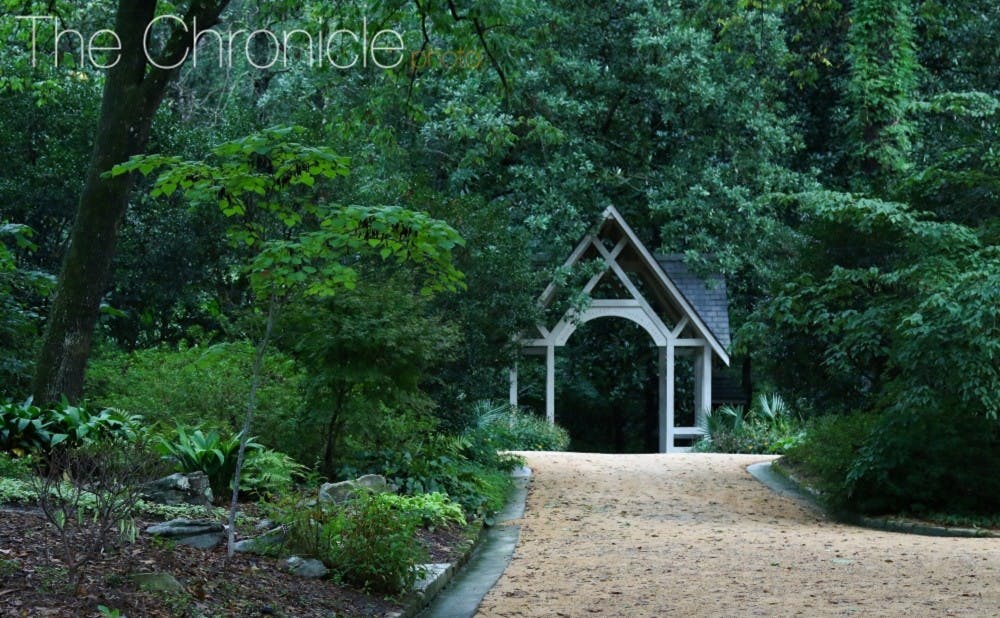If you’re not a graduate student — or a graduate student in the Nicholas School of the Environment, specifically — there’s a good chance you may not have heard about its leading publication, Eno Magazine. Founded in 2011, Eno Magazine is an annual arts and environment magazine that is run entirely by the Nicholas School community.
“I think [the magazine] is one of those things that kind of binds the Nicholas School community together,” said Alex Rudee, a student in the Masters of Environmental Management program who has previously submitted work to the magazine. “Although anyone can submit to the magazine, it’s really by and for this school.”
Although the magazine focuses on environmental issues and is therefore well-suited to the environmental community at Duke, its influence does not stop there. The magazine accepts and encourages submissions from people all over the world, including those within the greater Duke and Durham communities.
“The beauty of Eno Magazine is that it’s not just Duke students and staff, it’s not just the Duke community — it’s everyone and their mother can submit,” said Caitlyn Cooper, a co-editor of the magazine and a student in the Masters of Environmental Management program. “Obviously [the Duke community] is a big part of our audience because it surrounds us, but we’ve had general Durham community members submit, we’ve had people from other states submit, and it’s interesting because it allows us a lot more flexibility in creating the magazine to not have to focus on one cohort.”
Additionally, the magazine hosts several events in Duke and Durham throughout the year to encourage people to express themselves artistically and to get in touch with the nature around them. This semester, the magazine has hosted an “Art in the Gardens” event and will sponsor a Beer and Paint Night at Fullsteam Brewery. The magazine also encourages participants to submit art inspired by or created at these events.
“Our goal is to provide the supplies to get people to create some type of natural or nature-inspired art,” Cooper said. “I think people forget to take time out of their day for hobbies like painting and writing and photography, and [the events] kind of give people a scheduled time for them to work on it if they want to.”
Art serves as an important form of communication for the environmental community, and one of Eno Magazine’s main goals is to inspire and connect the larger non-science community to the environmental issues around them.
“When we were in professional communications class and we learned about op-eds, we were told use short words, short sentences and short paragraphs because people have short attention spans,” Cooper said. “And I think if a picture says a thousand words, having a magazine full of beautiful nature photos really is going to grab people’s attention a lot easier than a scientific or news article can.”
However, submissions from members outside of the sciences and environmental communities are highly encouraged. Nature has been the basis for art in various forms throughout history, rising to particular prominence with the transcendentalist movement and visible today in magazines like National Geographic. Even though an understanding of nature’s chemistry and complexity is interesting, it’s not necessary to appreciate it.
“Science by itself is not necessarily persuasive to a lot of the population,” Rudee said. “But what does persuade people are stories and images and videos, things that you can really relate to. … It’s really just a lot more of an emotional impact that you can get in an art magazine than in a scientific journal.”
The magazine is now accepting submissions for its 2018 publication, and is looking forward to holding its annual contest at the end of the fall semester. This year’s contest will be a writing contest, different from previous years’ photo competitions.
“We changed it to a writing contest because we have no shortage of photo submissions, but we do have a shortage of poetry and short story submissions,” Cooper said. “I don’t necessarily think that there are a shortage of writers but I think there are a lot of writers who are timid about their writing, whereas it’s easy for people to recognize if they took a great photo.”
Even if you’re not an artist or an environmental science major, participating in events hosted by the magazine or picking up a copy can offer a brief respite from the hectic pace of everyday college life. If you don’t have time to get off campus and explore nature, sometimes looking at the photos or reading the essays contained in Eno Magazine can be just as beneficial.
Get The Chronicle straight to your inbox
Sign up for our weekly newsletter. Cancel at any time.

